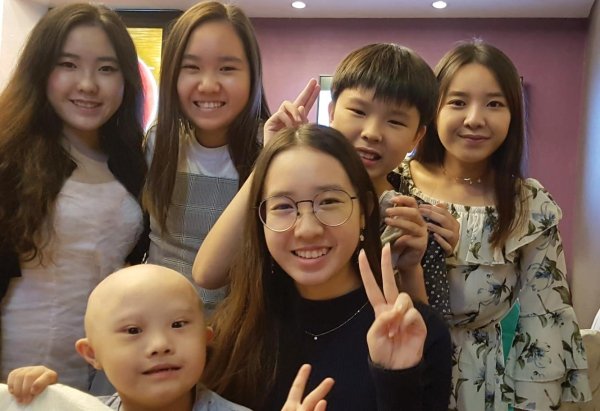Eugene and Ann Keng are ordinary parents of a large family with six children in Singapore. They are in their late forties, and celebrated their 20th wedding anniversary in December 2018. Recently they were faced with the challenge of doing without the services of their domestic helper, Lita Ganiron, for three weeks. While Lita has gone on home leave every year, this is the first time that she has taken such a long leave during the children’s school term.
While the thought of getting temporary home help crossed their minds, Eugene and Ann decided that the older children should be given more responsibilities and they should organise the family to make do without any help at all.
Their main concern was their youngest son Jerome, who has Down’s Syndrome. Now seven years old, Jerome has developmental speech delay and still needs assistance in his basic activities of daily living. So it became obvious that Jerome would become the priority for the family as he needed a lot of special help from every member of the family comprising Daddy, Mummy, his four older sisters, Clarice (19 years old), Charlene (18), Cheryl (17), Celeste (15+), and older brother Joel who at 11+ may be more of a hindrance than a help.
A time table with daily chores was drawn up by Ann and it was presented to the family at dinner one evening. The tasks included making the beds in the mornings, vacuuming the floors, washing, folding and ironing of clothes, cooking for the family, washing the dishes, taking out the garbage and even cleaning the bathrooms! Everyone was apprehensive at first as they were not sure they would be able to cope with the extra responsibilities.

To their pleasant surprise, everything went smoothly. Everyone in the family did their assigned chores, and sometimes more than what was expected of them.
Clarice learnt to use the vacuum cleaner efficiently and kept the house neat and tidy; she even complained when there was litter on the floor.
Charlene volunteered to be Jerome’s care giver. She fetched him from the school bus daily, changed his clothes and ensured he had his meals on time. She bathed him every evening before bed and persevered even when he yelled for Mummy to give him his bath instead. If she was unable to fulfil her duty because of school assignments and group work, she would get her other sisters to cover for her. They did so without a word of complaint.
Cheryl demonstrated the most improvement in the area of home-keeping among her siblings. When she was in her early teenage years, she would excuse herself from all menial household chores. But since she was waiting to enroll in the polytechnic, she realized she was available to help out in everything. While the other siblings were busy with their school schedule, she cared for the needs of the others instead of giving excuses. She would fill her siblings’ water bottles before they left for school and helped with laundry diligently. Her free time was usually spent playing with Jerome. This would further endear him to her. He is particularly fond of her and usually seeks her out for recreation time.
Celeste, currently studying for her O-level examination, was exempted from menial tasks. However, she would still voluntarily help around the house since she has a caring nature. Even in normal circumstances, she would not hesitate to offer her help when she sees the need to. She also knows that “many hands make the work lighter.”
Joel leaves for school early in the morning and often comes home after his co-curricular activities in the late afternoon. He was not expected to provide much help at home, but to everyone’s surprise he cheerfully washes the dishes, brings out the garbage and even helps with folding laundry. He now understands the meaning of showing love through voluntary acts of service in the family.
The house was often filled with laughter and giggles as someone recalled funny anecdotes or events at the usual evening get-togethers. But some days NOTHING got done. The house was messy, clothes and books were strewn all around, everyone seemed to be busy on their phones rather than doing their share of chores. Look, it’s raining. Did anyone even bother to bring in the laundry before it was soaked again? Jerome needs a drink of water. He’s being ignored again. Oh no, he’s wet himself.. Wait…who’s helping him? The Kengs are after all just a family of ordinary people. Fortunately these times were few and far between, and God showed His kindness by helping ensure the house ran smoothly and uneventfully.
Although looking after Jerome requires great patience and effort, he has the ability to draw out the best responses in his siblings. The girls made a special effort to stay home more frequently so they could assist him. Through these challenging weeks, everyone realised more so than before that he is indeed a very special blessing for the family.
Despite a busy schedule of work commitments and school assignments, time was found for spiritual needs like praying the Rosary together and Stations of the Cross during Lent. Through these spiritual activities, the family bonded even more closely as they shared responsibilities and grew in love for each other.
The children also made the important discovery that doing the small things well meant a lot for the smooth functioning of family life, and each felt the others' appreciation. They came to realise that the big challenges in life are solved by the many small achievements in the ordinary activities of daily living. Ann and Eugene hope that by growing in this spirit of serving others, their children come to realise that their talents of hard work, initiative and fortitude are all gifts they have received from God, which they need to employ for the good of others.
